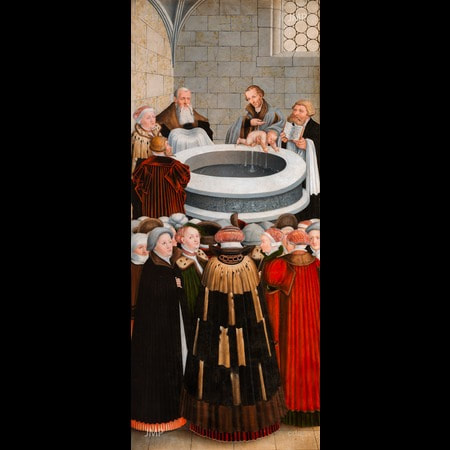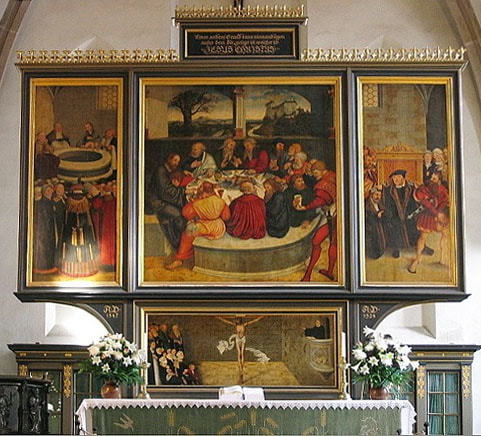Psalm 51
2 Kings 5:1-14
Titus 3:3-8
Matthew 28:16-20
March 3, 2021
Baptism saves you. (Mark 16:16; 1 Peter 3:21) Many reject this statement, because faith alone saves. Yes, it is true that faith alone saves apart from our works (Ephesians 2:8), but that does not mean the Baptism does not save. Faith saves, because it receives the benefits of the promise. Faith believes and trusts in what God promises us, and so it receives the benefits, as Abraham believed God and it was counted to him as righteousness. Baptism is a means of grace. A means of grace is a way by which God delivers to you his grace. Baptism delivers God’s grace to you just as the preaching of the Gospel delivers God’s grace to you. And as you receive the benefits of the preaching of the Gospel by believing its promises, so also you receive the benefits of Baptism by believing its promises. To say that Baptism doesn’t save, because only faith saves, is like saying that the preaching of the Gospel does not save, because only faith saves. But that would be plain silly. The preaching of the Gospel saves, because its benefits, namely, the forgiveness of sins and eternal salvation, are received through faith (Romans 1:16-17; 10:13-17; 1 Timothy 4:16; James 1:21) .
But people will object by saying that Baptism cannot save, because our works cannot save us. It is true that our works cannot save us, because they are imperfect and stained with sin. But Baptism is not our work, but God’s work. Your Small Catechism explains it simply:
What is Baptism? Baptism is not just plain water, but it is the water included in God’s command and combined with God’s word.
Which is this word of God? Christ our Lord says in the last chapter of Matthew: “Therefore go and make disciples of all nations, baptizing them in the name of the Father and of the Son and of the Holy Spirit.” (Matthew 28:19)
So, we see clearly from Jesus’ words that he commands us to baptize, that people are made into his disciples through Baptism, and that Baptism is done in the name of the Father, and of the Son, and of the Holy Spirit. So, it is clear that God is at work in Baptism. You may see a man pour the water or hear a man’s voice speak, but it is God’s voice and God working through the water. Otherwise, the Baptism would not be able to accomplish anything.
Furthermore, Jesus promises great blessings in Baptism. Again, your Small Catechism explains it simply:
What benefits does Baptism give? It works forgiveness of sins, rescues from death and the devil, and gives eternal salvation to all who believe this, as the words and promises of God declare.
Which are these words and promises of God? Christ our Lord says in the last chapter of Mark: “Whoever believes and is baptized will be saved, but whoever does not believe will be condemned.” (Mark 16:16)
You see how the Catechism goes straight to Jesus’ words to find out what Baptism is and what it does. This is always the way to go, because Jesus is our great teacher and he teaches us the way to salvation. This is what gives us such confidence in Baptism. We recognize that water is plain water, but in Baptism is it not just plain water, but water joined to God’s most powerful and gracious word! Again, the Catechism explains:
How can water do such great things? Certainly not just water, but the word of God in and with the water does these things, along with the faith which trusts this word of God in the water. For without God’s word the water is plain water and no Baptism. But with the word of God it is a Baptism, that is, a lifegiving water, rich in grace, and a washing of the new birth in the Holy Spirit, as St. Paul says in Titus, chapter three:
“He saved us through the washing of rebirth and renewal by the Holy Spirit, whom He poured out on us generously through Jesus Christ our Savior, so that, having been justified by His grace, we might become heirs having the hope of eternal life. This is a trustworthy saying.” (Titus 3:5-8)
Baptism is not an additional object of faith to Jesus’ crucifixion, death, and resurrection. The object of faith is what faith trusts in. Baptism does not replace or add to Jesus’ cross, just as the preaching of the Gospel is nothing without the crucifixion, death, and resurrection of Jesus. Rather, Baptism joins us to Jesus’ work of salvation. St. Paul says in Romans 6, “We were buried therefore with him by baptism into death, in order that, just as Christ was raised from the dead by the glory of the Father, we too might walk in newness of life. For if we have been united with him in a death like his, we shall certainly be united with him in a resurrection like his.” Again, Scripture says in Galatians 3, “For as many of you have been baptized into Christ have put on Christ.” Baptism saves, because it joins you to Jesus and his work of salvation. In 1 Peter chapter 3, the Apostle declares, “Baptism now saves you, not as a removal of dirt from the body, but as an appeal to God for a good conscience, through the resurrection of Jesus Christ.” You cannot look at your Baptism apart from the death and resurrection of Jesus Christ. Baptism does not add something to the Gospel, but rather, it is a means by which God gives you the one and same Gospel, which saves, as Scripture declares, “One Lord, one faith, one Baptism.”
Baptism is God’s way of giving you certainty that Jesus’ death and resurrection are for you. In Baptism you have the right to say to the devil, “Stop accusing me! I have Christ’s righteousness.” You have the power to say to your conscience, “Yes, you have sinned and done wrong, but Christ Jesus has died for your sins and has forgiven you.” Baptism gives you comfort and confidence even before the gates of hell, because Baptism gives you Jesus.
Baptism is more powerful than we can even understand, but Baptism is also a sign. It signifies that we have been buried with Christ and that our sins have been washed away. In our Psalm, we recited with David, “Purge me with hyssop and I shall be clean; wash me, and I shall be whiter than snow.” Hyssop is a bitter herb. The Israelites used a hyssop branch to smear the blood of the Passover lamb on their doorposts and lintels, so that death would pass over their house. To be washed with hyssop is to be washed in the blood of the Passover lamb. In Baptism, you are washed in the blood of Jesus, the Passover Lamb to end all Passover lambs. The washing of water is the washing in Jesus’ blood. And you can return to this washing every day through repentance and faith in the forgiveness of sins. Baptism is a sign that God has washed you clean of all your sin. It teaches you what you cannot yet see, that God has cleansed your soul from all uncleanness.
By holding onto your Baptism, you hold onto Christ Jesus. Some say that since people who are baptized will often reject Christ that Baptism is nothing. But that is like saying that the preaching of the Gospel is nothing, or that Christ Jesus is nothing, because people reject him. No. If you reject your Baptism, you lose its benefits, but it remains a great and mighty wonder. But if you hold onto your Baptism through faith, you have an endless fountain of forgiveness and strength in the Holy Spirit. You cannot progress spiritually beyond your Baptism, because Baptism gives you Christ himself and places the name of God upon you. Rather, the Christian life is a life constantly returning to the promises in Baptism. And since Christ Jesus your Lord cannot be found untrustworthy or faithless, you can put your trust in the promises of your Baptism. Amen.
Midweek Lenten Series: The Means of Grace
“We will now return to the Gospel, which not merely in one way gives us counsel and aid against sin; for God is superabundantly rich [and liberal] in His grace [and goodness]. First, through the spoken Word by which the forgiveness of sins is preached [He commands to be preached] in the whole world; which is the peculiar office of the Gospel. Secondly, through Baptism. Thirdly, through the holy Sacrament of the Altar. Fourthly, through the power of the keys, and also through the mutual conversation and consolation of brethren, Matt. 18:20: Where two or three are gathered together, etc.”
The article above is from the Smalcald Articles, written by Martin Luther at the request of Elector John Frederick in December of 1536 and presented at the meeting of the Smalcaldic League in February of 1537. The Smalcald Articles are part of our Lutheran Confessions in the Book of Concord. In this particular article Luther explains that the one Gospel is given to us in multiple ways. These multiple ways are called the Means of Grace. They are means by which God gives us his grace. So, there is one Gospel, which reveals God’s grace to us in Jesus Christ. Yet, there are many means by which God gives us this Gospel. And no matter by which means the Gospel is given, it is received through faith alone. This Midweek Lenten Series, we will explore how rich and liberal our God is in his grace by examining the Means of Grace.


 RSS Feed
RSS Feed